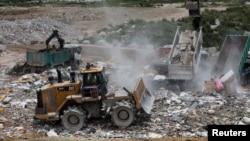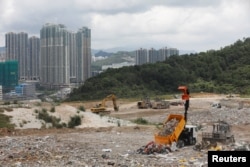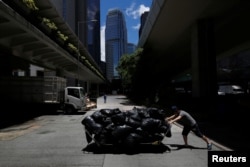From syringes and television sets strewn on its beaches to brimming landfills, Hong Kong is struggling to keep pace with a growing waste problem in one of the world's most densely populated cities.
Landfills in the global financial hub of 7 million people are nearly full as the volume of waste rises for a fifth straight year and recycling lags behind other Asian cities.
Tokyo, Seoul and Taipei each generate about half of Hong Kong's waste on a per capita basis, thanks to clean policies that encourage recycling, according to Hong Kong government data.
During British colonial rule which ended in 1997, landfills were the primary method for disposing of the city's waste, which has increased nearly 80 percent in the last 30 years.
As a result, the city's three landfills are expected to reach capacity in two years.
"We are running out of space and in some areas people are moving closer and closer to the landfills," said Christine Loh, Hong Kong's under secretary for the environment.
"We can't really extend them too much more," she said.
Hong Kong's density and exorbitant land prices have hampered recycling efforts, with operators reluctant to earmark sites for recycling facilities, environmentalists said.
With most people living in tight spaces, separating different types of waste is difficult because residents simply don't have enough room.
Tracy Read, chief executive and founder of Hong Kong-based Plastic Free Seas, said mom and pop-type recycling operations were not able to cope with the huge volume of waste.
"People don't believe anything gets recycled. I think people would generally be very happy to recycle if they had confidence in the system working," she said.
Pay for Throwing Away
The government has promised new infrastructure, including a multi-billion-dollar incinerator to be built on one of the island's most verdant locations. Critics argue the incinerator will add to pollution, waste public money and hurt efforts to promote recycling.
Loh said the incinerator was necessary to handle the average of 1.4 kg of trash every Hong Kong resident generates a day, according to official data.
The city is also considering a waste-charging scheme which helped to reduce waste levels by 20 percent in Taipei and Seoul.
"The economic tool - to get people to understand they are going to have to pay as they throw - is very powerful," Loh said.
However, the earliest possible start date for such a program would be the end of 2019.
Hong Kong's coastal waters and beaches are often strewn with rubbish from mainland China, where companies discharge waste into the sea to save the cost of proper disposal, according to conservationists.
When a large amount of garbage washed up on Hong Kong's beaches last summer, Hong Kong's top official, Leung Chun-ying, said the waste was from the mainland and he led officials in a public cleanup effort.
Paul Zimmerman, a Hong Kong district councilor and environmentalist, said waste management had been a low priority since the handover 20 years ago.
"The government has been extremely slow," he said. "They have been preoccupied with political reform, constitutional development and then kind of ignored the mundane issues of running a city smartly."















